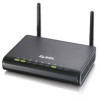ZyXEL NBG4604 User Guide - Page 93
Security Mode: WPA-PSK/WPA2-PSK
 |
View all ZyXEL NBG4604 manuals
Add to My Manuals
Save this manual to your list of manuals |
Page 93 highlights
Chapter 6 Wireless LAN Table 37 Network > Wireless LAN > WDS (Static WEP) LABEL Authentication Method DESCRIPTION There are two types of WEP authentication namely, Open System and Shared Key. Open system is implemented for ease-of-use and when security is not an issue. The wireless station and the AP or peer computer do not share a secret key. Thus the wireless stations can associate with any AP or peer computer and listen to any transmitted data that is not encrypted. Shared key mode involves a shared secret key to authenticate the wireless station to the AP or peer computer. This requires you to enable the wireless LAN security and use same settings on both the wireless station and the AP or peer computer. ASCII/HEX Keys 1 to 4t • Select Shared Key to have the NBG4604 authenticate only those wireless clients that use Shared Key mode and have the correct WEP key. • Select Auto to have the NBG4604 allow association with wireless clients that use Open System mode. Data transfer is encrypted as long as the wireless client has the correct WEP key for encryption. The NBG4604 authenticates wireless clients using Shared Key mode that have the correct WEP key. The WEP keys are used to encrypt data. Both the NBG4604 and the wireless stations must use the same WEP key for data transmission. If you chose 64-bit WEP, then enter any 5 ASCII characters or 10 hexadecimal characters ("0-9", "A-F"). If you chose 128-bit WEP, then enter 13 ASCII characters or 26 hexadecimal characters ("0-9", "A-F"). You must configure all four keys, but only one key can be activated at any one time. The default key is key 1. 6.11.2 Security Mode: WPA-PSK/WPA2-PSK Use this screen to configure the WPA-PSK or WPA2-PSK security for your NBG4604 when it is in AP + Bridge or Bridge Only mode. Figure 57 Network > Wireless LAN > WDS (WPA-PSK/WPA2-PSK) NBG4604 User's Guide 93















